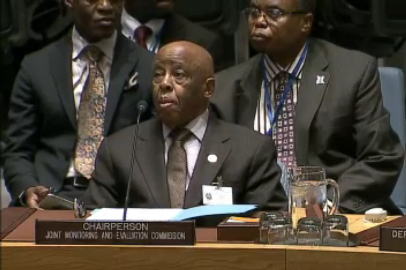S. Sudan guarantors reject delay in deployment of regional protection forces
November 12, 2016 (JUBA) – Guarantors of South Sudan’s peace accord have rejected the bureaucratic impediment in the deployment of the Regional Protection Force (RPF).

The guarantors warned that the security situation will continue, unless immediate actions are taken and stop violation of the ceasefire signed by its warring factions.
“We remain gravely concerned about the fragile security environment and the desperate economic and humanitarian situation in South Sudan. We particularly recognize the role played by neighbouring countries in hosting large numbers of refugees from the current crisis”, noted the statement.
“Continued violations of the ceasefire and the hindrance of humanitarian assistance are exacerbating the suffering of civilians and cannot be tolerated. All parties must take urgent steps to ensure that humanitarian actors are granted free, safe and unhindered access to people in need, in compliance with international obligations, and allow the people of South Sudan return safely to their homes and livelihoods”, it adds.
The summit in Kampala welcomed the decision of the Transitional Government of National Unity to accept deployment of the regional protection force and argued that institutions established under the deal like Strategic Defence and Security Review Board (SDSR), Joint Military Ceasefire Commission and Joint Operations Centre should be revived and strengthened to achieve sustainable security arrangements.
It also condemned hate speeches, ethnically targeted killings and incitement of violence. Such acts, it said, violates the peace deal and puts the future of the nation at risk.
The membership of the guarantors comprise Joint Monitoring and Evaluation commission , representatives of China, Ethiopia (Chair of the Intergovernmental Authority on Development (IGAD)), Nigeria, Norway, Rwanda, Somalia, South Africa, Sudan, the UK, the US, Uganda, the European Union, the IGAD Partners Forum represented by Canada, Germany and the Netherlands and the United Nations.
The guarantors hold regular high level meeting to assess progress made in the implementation of the peace agreement. They have, since the signing of the peace agreement held three meetings and held its fourth high-level meeting in Kampala on 10 November 2016 at which they discussed the current situation in South Sudan and measures that could be taken to end the continuing escalation of violence and ensure that efforts to build peace in South Sudan through the Agreement on the Resolution of the Conflict in the Republic of South Sudan are made more effective.
It expressed concern, saying violent clashes which began in July 2016 represent a serious breakdown in the fragile peace agreed under the peace deal. The situation in Juba remains fragile as tensions rise and violence increases across the rest of South Sudan. This fighting violates the peace agreement and is having a devastating impact on the lives of millions of South Sudanese people.
“We call for an immediate cessation of hostilities and encourage all armed groups to join the peace process as the only way forward for resolving political differences. There is no military solution to South Sudan’s problems,” the statement stressed.
“We commend the efforts of the JMEC under the leadership of former President Festus G. Mogae on its work to try to keep the peace agreement alive under these challenging circumstances. We recognise the important roles that IGAD Plus partners have played in supporting the JMEC and urge leaders in the region to remain actively engaged. We specifically recognise the role that Kenya has played so far, and express our hope that Kenya will continue to play a key role in supporting the peace process. We further note the commitments made by the Transitional Government of National Unity (TGNU) to keep the ARCSS (Agreement on the resolution of Conflict in the republic of South Sudan) alive”, it added.
The guarantors pf South Sudan’s peace agreement, further called for genuine and inclusive dialogue as the only way to resolve the country’s political differences.
“The only way forward in South Sudan is through a genuine and inclusive political process that sees all interests engaged in shaping the future of this young country. Inclusivity is not about individuals. Inclusivity means inviting all ‘parties’ to join the process peacefully and ensuring genuine representation of the national character in government. All parties must demonstrate their commitment to peace by taking meaningful steps to end violence and ceasefire violations. We strongly call on all parties to lay down their weapons and engage in peaceful and inclusive political dialogue – not just in Juba, but across the whole of South Sudan,” it added.
Meanwhile, leaders from the East African region and international community are due to meet to consider an appropriate action if they see no positive developments on the peace process.
“We will review progress at the next meeting of the JMEC Partners Group in February 2017,” the statement from the Kampala summit further stated.
(ST)
